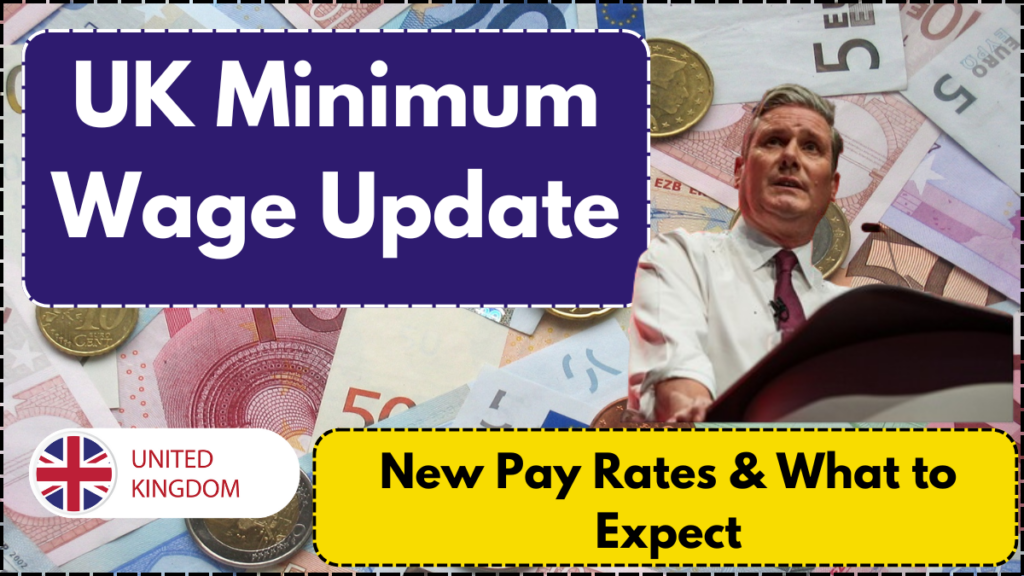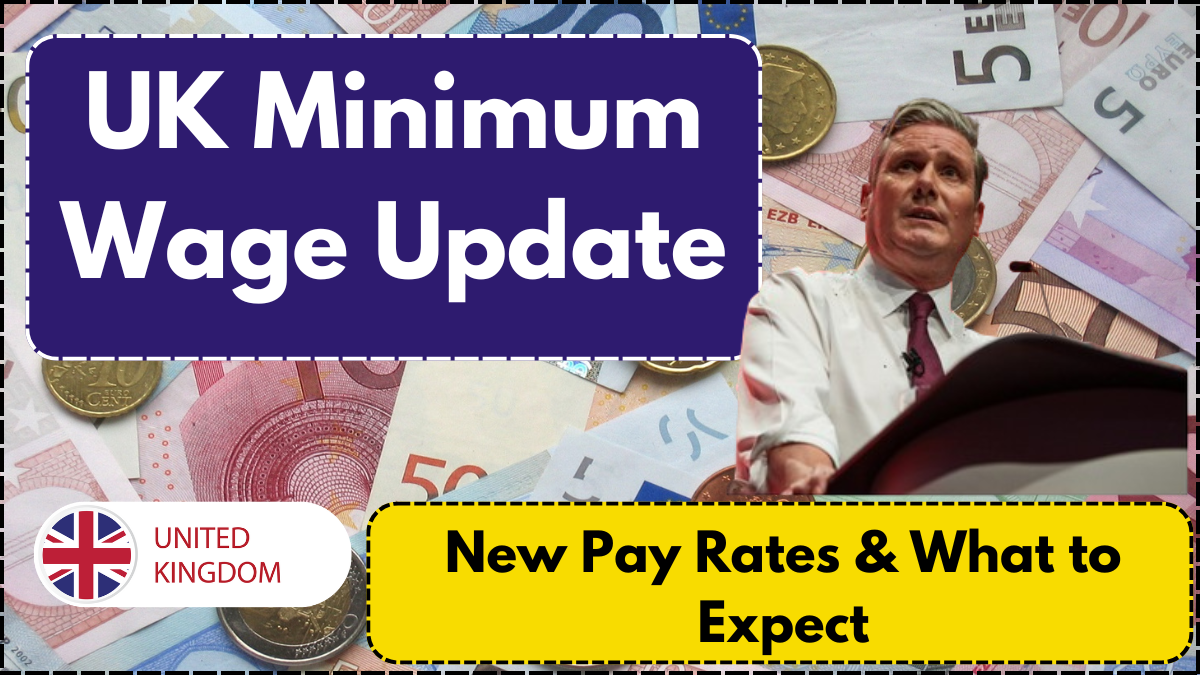Starting April 1, 2025, the UK Government will implement new minimum wage rates across different age groups. This decision aims to address inflation and support workers coping with the increasing cost of living. A significant change is the expansion of the National Living Wage (NLW), which will now apply to individuals aged 21 and above, reducing the previous threshold of 23+.

New UK Minimum Wage Rates for 2025
The updated wage rates, effective from April 2025, are outlined in the table below:
| Age/Category | 2024 Rate (£) | 2025 Rate (£) | Increase (£) | % Change |
|---|---|---|---|---|
| National Living Wage (21+) | 11.44 | 12.21 | 0.77 | 6.7% |
| 18–20 Year Old Rate | 8.60 | 10.00 | 1.40 | 16.3% |
| 16–17 Year Old Rate | 6.40 | 7.55 | 1.15 | 18.0% |
| Apprentice Rate | 6.40 | 7.55 | 1.15 | 18.0% |
| Accommodation Offset | 10.66 | 11.33 | 0.67 | 6.3% |
These wage adjustments represent one of the largest increases in over a decade, particularly benefiting younger workers who have historically earned lower wages.
How This Change Benefits Workers
For full-time employees aged 21 and above, the wage increase means a rise in annual earnings from approximately £22,918 to £24,441. This change comes with several advantages:
- Higher Take-Home Pay: Employees will have more disposable income to manage expenses such as rent, groceries, and utility bills.
- Enhanced Financial Independence: Those in part-time and hourly roles will experience greater financial security and stability.
- Closer to a Living Wage: Although this increase is substantial, campaigners continue to push for wages that better reflect actual living costs.
Challenges for Employers
While beneficial for workers, the increase presents financial and operational challenges for businesses, particularly in labor-intensive sectors such as retail, hospitality, and healthcare. Key concerns include:
- Higher Payroll Expenses: Businesses must allocate additional funds to cover increased wages.
- Price Adjustments: Companies may consider raising the prices of goods and services to offset additional costs.
- Administrative Updates: Employers must update payroll systems, employee contracts, and notify staff of their new pay rates.
Failure to comply with these changes could result in penalties of up to £20,000 per underpaid employee and potential legal action.
Government’s Objectives for Wage Reform
The government’s decision to increase the minimum wage aligns with broader economic and social policies aimed at:
- Reducing Wage Inequality: By raising pay for younger workers, income disparities between different age groups can be minimized.
- Boosting Consumer Spending: Higher wages lead to increased purchasing power, benefiting the economy.
- Encouraging Workforce Participation: A better pay structure may motivate individuals to join the workforce and reduce reliance on government welfare programs.
Practical Steps for Employees
To ensure they receive the correct wages, employees should take the following actions:
- Review Your Payslip in April 2025: Confirm that your employer has implemented the new rates correctly.
- Address Any Payment Discrepancies: If underpaid, discuss the issue with your employer and escalate it to Acas or Citizens Advice if necessary.
- Plan Your Finances Wisely: Allocate additional earnings toward essentials, savings, or debt repayment for greater financial security.
Workers Exempt from the New Minimum Wage Rates
The wage adjustments do not apply to the following categories:
- Self-Employed Individuals: Those running their own businesses set their own wages.
- Volunteers and Unpaid Interns: Individuals working voluntarily or in unpaid internships are not entitled to minimum wage protections.
- Armed Forces Personnel: Military employees follow separate pay structures.
- Family Workers in Home Businesses: Relatives working in a family business while residing in the same household may be exempt.
If you are uncertain about your eligibility, seek professional guidance or review government policies on wage entitlements.
Frequently Asked Questions (FAQs)
Q: When will the new wage rates take effect?
A: The updated rates will come into effect on April 1, 2025.
Q: Who qualifies for the National Living Wage?
A: As of 2025, workers aged 21 and above are eligible.
Q: What impact will this have on small businesses?
A: Small businesses may face higher labor costs, potentially requiring price adjustments or operational restructuring to maintain profitability.
Q: Will apprentices also receive a wage increase?
A: Yes, the Apprentice Rate will rise to £7.55 per hour from April 2025.
Q: What should I do if my employer does not follow the new wage laws?
A: If your employer does not implement the new rates, report the issue to Acas or Citizens Advice for further assistance.
By understanding these wage changes and preparing accordingly, both employees and businesses can navigate this transition effectively.
For More Information Click Here
Pari is a passionate writer known for captivating stories that blend imagination and reality. Inspired by travel, history, and everyday moments, Pari crafts narratives that resonate deeply with readers.
